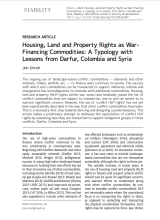Land Library Search
Through our robust search engine, you can search for any item of the over 73,000 highly curated resources in the Land Library.
If you would like to find an overview of what is possible, feel free to peruse the Search Guide.
/ library resources
Showing items 1 through 9 of 14.The ongoing use of landscape-based conflict commodities — diamonds and other minerals, timber, wildlife, etc. — to finance wars continues to evolve.
In many cities and urban areas in Africa, land acquisition for urban redevelopment, land readjustment, and resettlement of affected urban residents are currently framed as innovative approaches to eradicating informal settlements, improving the living environments, and supporting the implementati
In fulfillment of his manifesto promise to the people of Malen Chiefdom, Pujehun district and in consonance with the new direction government's determination to tend to the needs and aspirations of its people generally and to promote foreign direct investment, in a peaceful just and inclusi
Post-war societies not only have to deal with continuing unpeaceful relations but also land-related conflict legacies, farmland and forest degradation, heavily exploited natural resources, land mines, a destroyed infrastructure, as well as returning refugees and ex-combatants.
The rise of land deals poses unpredictable risks to war-torn societies, exposing them to the violent folds of the global economy.
There is wide engagement with large-scale land deals in sub-Saharan Africa, particularly from the perspectives of development and international political economy. Recently, scholars have increasingly pointed to a gendered lacuna in this literature.
Since the onset of the phenomenon of large scale land acquisition for agri-business in Sierra Leone, after the first whistle was blown by Green Scenery, many studies have been conducted by various researchers, some to meet requirements for degree thesis, others for policy and development purposes
The land grabbing issue has produced a plethora of debates ranging from ethical conduct of land grabbing agents, specifically concerning displacement, to evidence for and against positive externalities such as technological spill-overs and construction of infrastructure.







